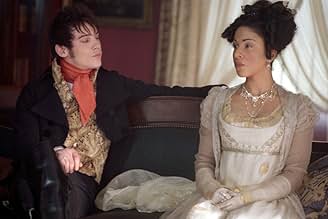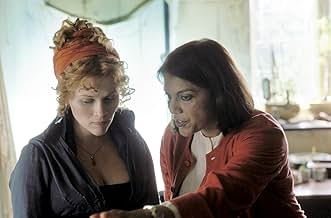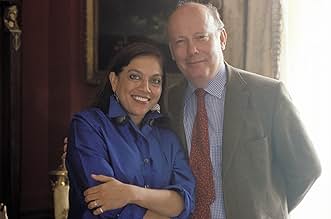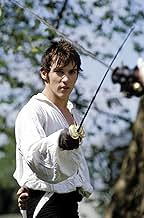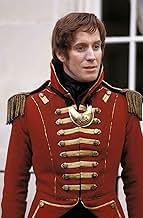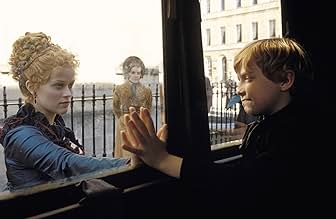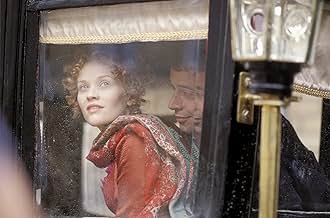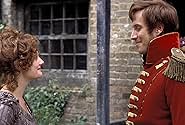VALUTAZIONE IMDb
6,2/10
23.941
LA TUA VALUTAZIONE
Crescendo povera a Londra, Becky Sharp sfida il suo passato di povertà e sale la scala sociale insieme alla sua migliore amica, Amelia Sedley.Crescendo povera a Londra, Becky Sharp sfida il suo passato di povertà e sale la scala sociale insieme alla sua migliore amica, Amelia Sedley.Crescendo povera a Londra, Becky Sharp sfida il suo passato di povertà e sale la scala sociale insieme alla sua migliore amica, Amelia Sedley.
- Regia
- Sceneggiatura
- Star
- Premi
- 2 vittorie e 5 candidature totali
Lillete Dubey
- Ms. Green
- (as Lillette Dubey)
Recensioni in evidenza
Elegant costumes, beautiful scenery, and piano playing in excess all add to the sights and sounds of Mira Nair's film 'Vanity Fair.' Her 2004 version is one of over ten tries to put William Makepeace Thackeray's novel onto the big screen. Most attempts failed miserably, lacking the magic of today's movies and failing to grasp the themes of the novel. Nair's version, with its visual and audible pleasures, has the potential to become one of the few successful attempts. With humble beginnings as a poor child with a starving artist as her father, Becky (Reese Witherspoon) was determined to overcome her circumstance. She managed to work her way into a governess position in a down-on-his-luck aristocrat. New opportunities arise, and she hastily abandons her post to become the companion to a wealthy woman known only as Miss Crawley (Eileen Atkins). Much to Miss Crawley's displeasure, Becky wastes no time in her quest to climb the social ladder and marries into the family. Becky's new husband, Crawley's nephew, is soon sent off to war. Returning after the battle of Waterloo, their marriage is rocky due to his gambling debts and her never-ending quest to raise her social status. Meeting a man who collected her late father's art, she uses his money and his influence to continue her rise in the social hierarchy, causing more distress to their marriage. Nair attempted to bring something new to the film, using her fantastic creative talents in the costuming and scenery. Her musical choices weren't overwhelming and accented the film rather than hiding behind its beautiful visual aspects. She tried to cover the expanse of the novel, but ending up making a summary of the story and leaving the characters bland and undeveloped. Nair intentionally portrays Becky as a victim of the social system, showing her as merely taking advantage of circumstantial events. This contradicts harshly with Thackeray's Becky, who is manipulative and cunning, turning circumstantial events into anything that will benefit her rise up the social ladder. This movie is beautifully made and had the potential to become something great, but Nair's overly eager attempt leaves it as nothing more than another mediocre film. Had she paid as much attention to the plot and the characters as she did to the audio and visual aspects, this would definitely be the best film of the year. But she didn't, so don't waste your seven dollars to see it in the theater. Wait for the video, or better yet, wait for that one Friday night when you are home alone and it comes on cable.
6=G=
"Vanity Fair" (2004) is an acceptable but abbreviated version of the classic Thackery Victorian period novel which tells of Becky Sharp (Witherspoon), who uses artifice and charm to climb from lowly governess to aristocrat, always able to find a suitable family of peerage or property to use as a rung in her ladder to the top in spite of the tribulations of the time. At just over two hours, this film cannot deal in depth with the many characters in the story and has to content itself with hitting the high points which make for a very condensed telling suited to those who only wish the flavor of the story. Those with a particular interest in Victorian pulp fiction or more expansive dramas should turn to the BBC's 1998 six hour miniseries which offers greater character depth, a presentation much more true to the period, and a very much better cast. (B-)
William Thackerey's "Vanity Fair" has been adapted for the screen and television in numerous occasions. It is almost an impossible task to get a coherent take on a narrative that spans a lot of years and in which a lot happens.
This adaptation of the book by Mira Nair with the adaptation by Julian Fellowes, is sumptuously photographed by Declan Quinn, who captures the Regency period in the England at the beginning of the XIX century. Ms. Nair's touch is evident in the way the costumes have an Indian flair as they were brilliantly executed by designer Beatrix Aruna Pasztor. Maria Djurkovic's wonderful production design is also an asset.
If anything, this reincarnation of the Thackerey's novel is a joy for the eyes. The rich period in which the action takes place comes alive in the screen as a feast of colors, which in a way, compensate for the failings on the story and in the way Ms. Nair conceived the way she wanted to tell this tale about an ambitious young woman who is the epitome of social climbing. As a character puts in the film, Becky Sharp would be a perfect mountaineer.
Part of what is wrong with the film is Reese Witherspoon in the central role. Not that her interpretation is wrong, it's that she doesn't project the character of Becky Sharp with an intensity that another actress might have brought to the role. In part, this might not have been Ms. Witherspoon's fault, but the director's, in the way she guided the key performance.
The other failure of the film lies in the last scenes in which one finds Becky in Baden-Baden. Becky, Amelia, and Dobbins, haven't aged one iota. For the sake of realism, a bit of old age makeup should have been applied to these actors, or else, one might believe in the curative waters of that German spa. If it was true, we should be taking the next flight to Germany. After all, if that were the case, it would be the end of plastic surgery as we know it!
Some of the best actors of the English stage and screen are seen in various roles. Bob Hoskins, Eileen Atkins, Jim Broadbent, Gabriel Byrne, Barbara Leigh-Hunt, Rhys Ifan, Romola Garai, Jonathan Rhys-Meyer, James Purefoy, just to name a few, do an excellent job in the portrayal of their characters.
This "Vanity Fair", although flawed, is not a total failure. Mira Nair shows an amazing talent for being in command of such a large project.
This adaptation of the book by Mira Nair with the adaptation by Julian Fellowes, is sumptuously photographed by Declan Quinn, who captures the Regency period in the England at the beginning of the XIX century. Ms. Nair's touch is evident in the way the costumes have an Indian flair as they were brilliantly executed by designer Beatrix Aruna Pasztor. Maria Djurkovic's wonderful production design is also an asset.
If anything, this reincarnation of the Thackerey's novel is a joy for the eyes. The rich period in which the action takes place comes alive in the screen as a feast of colors, which in a way, compensate for the failings on the story and in the way Ms. Nair conceived the way she wanted to tell this tale about an ambitious young woman who is the epitome of social climbing. As a character puts in the film, Becky Sharp would be a perfect mountaineer.
Part of what is wrong with the film is Reese Witherspoon in the central role. Not that her interpretation is wrong, it's that she doesn't project the character of Becky Sharp with an intensity that another actress might have brought to the role. In part, this might not have been Ms. Witherspoon's fault, but the director's, in the way she guided the key performance.
The other failure of the film lies in the last scenes in which one finds Becky in Baden-Baden. Becky, Amelia, and Dobbins, haven't aged one iota. For the sake of realism, a bit of old age makeup should have been applied to these actors, or else, one might believe in the curative waters of that German spa. If it was true, we should be taking the next flight to Germany. After all, if that were the case, it would be the end of plastic surgery as we know it!
Some of the best actors of the English stage and screen are seen in various roles. Bob Hoskins, Eileen Atkins, Jim Broadbent, Gabriel Byrne, Barbara Leigh-Hunt, Rhys Ifan, Romola Garai, Jonathan Rhys-Meyer, James Purefoy, just to name a few, do an excellent job in the portrayal of their characters.
This "Vanity Fair", although flawed, is not a total failure. Mira Nair shows an amazing talent for being in command of such a large project.
This is an entertaining movie that goes over two hours, but I really don't understand why it was made. Sprawling stories spanning several decades with several subplots involving dozens of characters are totally defensible on the printed page, where we can always go back and remind ourselves which character is which and how this character is related to that one. But this type of thing makes no sense whatsoever in a film. Unless a viewer has a phenomenal memory, such a story on film invariably leads to confusion and to my asking myself, "now wait a minute, whose brother is this, and whose son?"
So that is one of the principal problems with this film.
There are several other problems as well. Reese Witherspoon is badly miscast. She simply lacks Becky Sharp's bite. In fact, the whole film lacks Thackeray's bite. Reese does a good job with the British accent, but it just doesn't work. She is just too American for the role. Weren't there any British actresses available, or were the producers just relying on Reese's star power? Reese is just too nice to play Becky.
It has often been said that Becky Sharp was the model for Scarlett O'Hara in "Gone With the Wind," although Margaret Mitchell denied this. Even so, I kept visualizing Vivien Leigh in this role and imagining how perfect she would have been. I think Mira Nair was thinking of GWTW as well, because there are several scenes in the film that are obvious homages to it. First there are the battle scenes during the Battle of Waterloo, followed by a panoramic view of the carnage following the battle, complete with corpses strewn all over the battlefield. This was an obvious homage to the crane shot over Atlanta in GWTW. The final fight between Becky and her husband reminded me of the final fight between Scarlett and Rhett in GWTW. I half expected the husband to say "Frankly, my dear, I don't give a damn."
Another flaw involves the Indian director Nair's inability to resist bringing in some Bollywood type scenes, particularly one involving Becky leading an Indian type dance, with Indian music, before the king, no less, and to thunderous applause.
And yet another thing: this film spans at least twenty, maybe twenty-five or thirty, years in Becky's life after she graduates from finishing school--I am not counting the one scene of her as a child--yet the character never ages. Neither do any of the other characters. Maybe the makeup staff went on strike?
But most of these problems won't even be noted by someone who hasn't read the book, so if you haven't, go ahead and see it; you'll probably be entertained. And if you are someone like me who loves the book, you may not be able to resist seeing it anyway. But Thackeray was never so soft.
So that is one of the principal problems with this film.
There are several other problems as well. Reese Witherspoon is badly miscast. She simply lacks Becky Sharp's bite. In fact, the whole film lacks Thackeray's bite. Reese does a good job with the British accent, but it just doesn't work. She is just too American for the role. Weren't there any British actresses available, or were the producers just relying on Reese's star power? Reese is just too nice to play Becky.
It has often been said that Becky Sharp was the model for Scarlett O'Hara in "Gone With the Wind," although Margaret Mitchell denied this. Even so, I kept visualizing Vivien Leigh in this role and imagining how perfect she would have been. I think Mira Nair was thinking of GWTW as well, because there are several scenes in the film that are obvious homages to it. First there are the battle scenes during the Battle of Waterloo, followed by a panoramic view of the carnage following the battle, complete with corpses strewn all over the battlefield. This was an obvious homage to the crane shot over Atlanta in GWTW. The final fight between Becky and her husband reminded me of the final fight between Scarlett and Rhett in GWTW. I half expected the husband to say "Frankly, my dear, I don't give a damn."
Another flaw involves the Indian director Nair's inability to resist bringing in some Bollywood type scenes, particularly one involving Becky leading an Indian type dance, with Indian music, before the king, no less, and to thunderous applause.
And yet another thing: this film spans at least twenty, maybe twenty-five or thirty, years in Becky's life after she graduates from finishing school--I am not counting the one scene of her as a child--yet the character never ages. Neither do any of the other characters. Maybe the makeup staff went on strike?
But most of these problems won't even be noted by someone who hasn't read the book, so if you haven't, go ahead and see it; you'll probably be entertained. And if you are someone like me who loves the book, you may not be able to resist seeing it anyway. But Thackeray was never so soft.
In many ways, director Mira Nair is a daring, imaginative choice to helm this latest film adaptation of William Makepeace Thackeray's classic novel of social mores in early 19th century England. But the end result of her vision is on the whole, rather disappointing. What could have been an energetic distillation of the book's themes turns into a lengthy episodic movie suffering from poor pacing and softened characters. It is a feast for the eyes though, as it appears Nair is intent on bringing her native India into the film as much as possible from the brightly colored period costumes to the contemporary-looking exotic dance at the Marquess of Steyne's party (with very anachronistic Rai music in the background) to the happy ending atop an elephant in Jodhpur. All these references remain true to the Calcutta-born author's story, and actually they feed into the English imagination of what India meant to them at the time. At the same time, the images are too overwhelming to make the basic story of Becky Sharp resonate as it should. Her evolution is the heart of the story, as she moves from finishing school outsider to resourceful governess to brave captain's wife to fallen woman in a casino. It's a long, rocky journey, almost too long for a 137-minute movie to bear as it turns out. Nair, however, also has a good handle on the comic banter among the characters, and it certainly helps that she has assembled a "Who's Who" of British stage and film in all the roles except the primary one.
As Becky, Reese Witherspoon gives it a valiant effort and perfects her British accent to Gwyneth Paltrow's standards, but she seems to be channeling a hybrid of her Elle Woods ("Legally Blonde") and her Tracy Flick (in Alexander Payne's "Election") by way of Kate Winslet in "Sense and Sensibility". When facing down her opponents in her climb upward, especially in the early scenes, the performance seems right. But when her character takes on Scarlett O'Hara dimensions in wartime suffering and acts of betrayal, she seems young and overwhelmed, and her reactions come across as too modern to be true to the character's evolution as intended. This anomaly results in a Becky Sharp who is not so much an ambitious social climber but a plucky heroine for the underclasses, a textbook example of a Tony Robbins motivational seminar. This transformation may seem endearing to those looking for nicely wrapped tales of triumph against all odds, but it doesn't lend credibility to the more pointed satire and harsher criticisms that Thackeray had in mind when he wrote the book. For example, Becky's gambler husband, Rawdon Crawley, is really more of a ne'er-do-well whose departure in the story should be viewed somewhat as relief, but as played by James Purefoy, he is a romantic figure who is guilt-ridden over his failure to provide for his family. The change could have been acceptable were it not for the fact that his character is discarded in an almost matter-of-fact way. The same sketchy treatment is given to Becky's only friend, Amelia Sedley, played by Romola Garai, who is set up as a contrast to Becky and comes across as a wet rag for much of the story. But the film transforms her into a brave widow whose romantic resolution at the end strains credibility. Somehow Purefoy and Garai acquit themselves admirably regardless.
There are many fine performances in the smaller roles. Worth mentioning are Jim Broadbent as roguish George Osborne's unforgiving father, Bob Hoskins as the clownishly pitiable Sir Pitt; Gabriel Byrne as the territorially devious Marquess of Steyne, and Geraldine McEwan's helium-voiced Lady Southdown. Best of all is the mordantly witty Eileen Atkins, who seems to understand the tone of Thackeray's story better than anyone else, and lends a dotty authority to the role of Aunt Mathilde, serving as the primary catalyst of Becky's social escalation much to her later regret. Great acting aside, the film's length does have a wearing effect since the climax does not bear the emotional weight of everything that has gone before it, and unfortunately the plot strands get wrapped up much too quickly at the end to make the story truly resonate. That's a shame since there is so much creative energy obviously at work here.
As Becky, Reese Witherspoon gives it a valiant effort and perfects her British accent to Gwyneth Paltrow's standards, but she seems to be channeling a hybrid of her Elle Woods ("Legally Blonde") and her Tracy Flick (in Alexander Payne's "Election") by way of Kate Winslet in "Sense and Sensibility". When facing down her opponents in her climb upward, especially in the early scenes, the performance seems right. But when her character takes on Scarlett O'Hara dimensions in wartime suffering and acts of betrayal, she seems young and overwhelmed, and her reactions come across as too modern to be true to the character's evolution as intended. This anomaly results in a Becky Sharp who is not so much an ambitious social climber but a plucky heroine for the underclasses, a textbook example of a Tony Robbins motivational seminar. This transformation may seem endearing to those looking for nicely wrapped tales of triumph against all odds, but it doesn't lend credibility to the more pointed satire and harsher criticisms that Thackeray had in mind when he wrote the book. For example, Becky's gambler husband, Rawdon Crawley, is really more of a ne'er-do-well whose departure in the story should be viewed somewhat as relief, but as played by James Purefoy, he is a romantic figure who is guilt-ridden over his failure to provide for his family. The change could have been acceptable were it not for the fact that his character is discarded in an almost matter-of-fact way. The same sketchy treatment is given to Becky's only friend, Amelia Sedley, played by Romola Garai, who is set up as a contrast to Becky and comes across as a wet rag for much of the story. But the film transforms her into a brave widow whose romantic resolution at the end strains credibility. Somehow Purefoy and Garai acquit themselves admirably regardless.
There are many fine performances in the smaller roles. Worth mentioning are Jim Broadbent as roguish George Osborne's unforgiving father, Bob Hoskins as the clownishly pitiable Sir Pitt; Gabriel Byrne as the territorially devious Marquess of Steyne, and Geraldine McEwan's helium-voiced Lady Southdown. Best of all is the mordantly witty Eileen Atkins, who seems to understand the tone of Thackeray's story better than anyone else, and lends a dotty authority to the role of Aunt Mathilde, serving as the primary catalyst of Becky's social escalation much to her later regret. Great acting aside, the film's length does have a wearing effect since the climax does not bear the emotional weight of everything that has gone before it, and unfortunately the plot strands get wrapped up much too quickly at the end to make the story truly resonate. That's a shame since there is so much creative energy obviously at work here.
Lo sapevi?
- QuizAfter asking Reese Witherspoon to get pregnant for the role (as a joke, because she thought Reese was too thin), director Mira Nair was delighted when Witherspoon announced she was pregnant after all.
- BlooperDuring the dance scene, a musician plays a metal flute, which was invented by Theobald Boehm around 1832.
- Citazioni
Mrs. Sedley: I thought her a mere social climber, but now I see she's a mountineer
- Curiosità sui creditiBefore the credits start rolling the word "Alvida" (goodbye) appears in Urdu script. Beneath it is the following dedication: for our beloved Ammy Kulsum Alibhai 1927-2003
- Colonne sonoreShe Walks in Beauty
Lyrics by Lord Byron (as Lord George Gordon Byron)
Music by Mychael Danna
Produced by Mychael Danna
Performed by Sissel (as Sissel)
Sissel appears courtesy of Universal Music, AS Norway and Stageway Talent, AS
I più visti
Accedi per valutare e creare un elenco di titoli salvati per ottenere consigli personalizzati
- How long is Vanity Fair?Powered by Alexa
Dettagli
- Data di uscita
- Paesi di origine
- Lingue
- Celebre anche come
- Vanidad
- Luoghi delle riprese
- Holburne Museum of Art, Bath, Somerset, Inghilterra, Regno Unito(Lord Steyne's residence)
- Aziende produttrici
- Vedi altri crediti dell’azienda su IMDbPro
Botteghino
- Budget
- 23.000.000 USD (previsto)
- Lordo Stati Uniti e Canada
- 16.136.476 USD
- Fine settimana di apertura Stati Uniti e Canada
- 4.800.000 USD
- 5 set 2004
- Lordo in tutto il mondo
- 19.463.185 USD
- Tempo di esecuzione2 ore 21 minuti
- Colore
- Mix di suoni
- Proporzioni
- 2.35 : 1
Contribuisci a questa pagina
Suggerisci una modifica o aggiungi i contenuti mancanti

Divario superiore
By what name was La fiera della vanità (2004) officially released in India in English?
Rispondi

